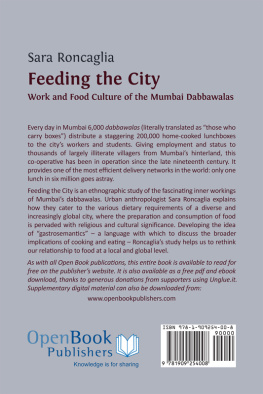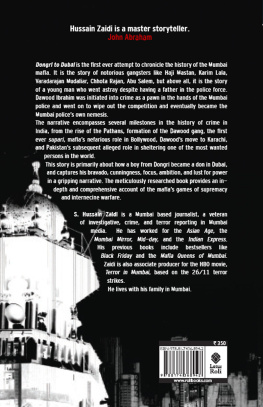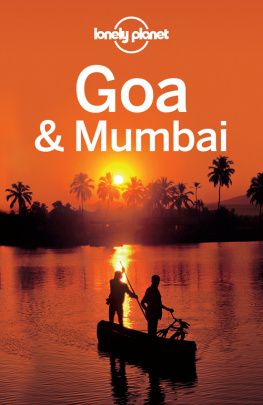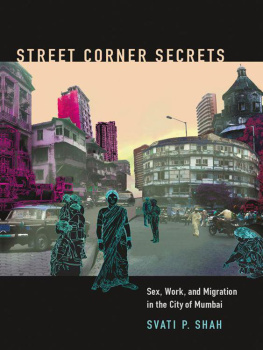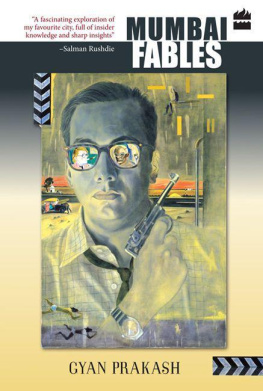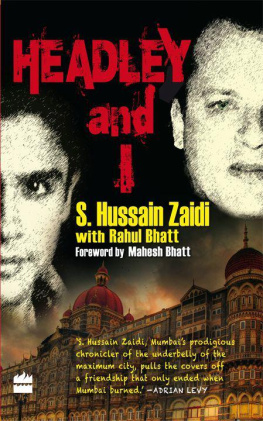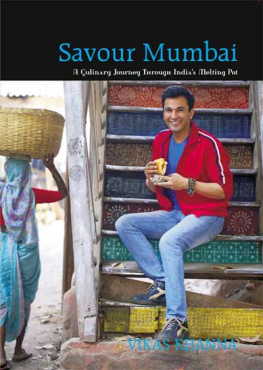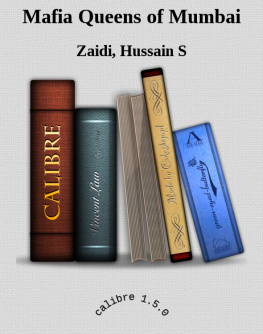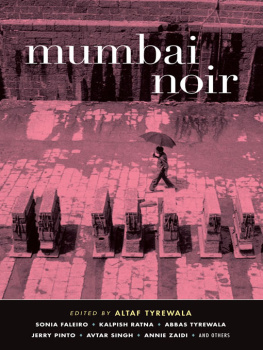FEEDING THE CITY
FEEDING THE CITY:
WORK AND FOOD CULTURE OF THE MUMBAI DABBAWALAS
Sara Roncaglia


Sara Roncaglia.
This book is licensed under a Creative Commons Attribution-NoDerivs 3.0 Unported Licence: http://creativecommons.org/licenses/by-nd/3.0/

This license allows for copying any part of the work for personal and commercial use, providing the work is not translated or altered and the following author and publisher attribution is clearly stated:
Sara Roncaglia, Feeding the City: Work and Food Culture of the Mumbai Dabbawalas (Cambridge: Open Book Publishers, 2013).
As with all Open Book Publishers titles, digital material and resources associated with this volume are available from our website at:
http://www.openbookpublishers.com/isbn/9781909254008
ISBN Hardback: 978-1-909254-01-5
ISBN Paperback: 978-1-909254-00-8
ISBN Digital (PDF): 978-1-909254-02-2
ISBN Digital ebook (epub): 978-1-909254-03-9
ISBN Digital ebook (mobi): 978-1-909254-04-6
DOI: 10.11647/OBP.0031
Cover image: Preparation of a meal in Mumbai, May 2007. Photo by Sara Roncaglia.
Translated from the Italian by Angela Arnone.
Typesetting by www.bookgenie.in
All paper used by Open Book Publishers is SFI (Sustainable Forestry Initiative), and PEFC (Programme for the Endorsement of Forest Certification Schemes) Certified.
Printed in the United Kingdom and United States by Lightning Source for Open Book Publishers (Cambridge, UK).

This is an unglued e-book
This unglued edition is freely available to download from our website and distributed under the terms of the Creative Commons CC-BY-ND licence (allowing you to copy any part of the work for personal and commercial use, providing the work is not translated or altered and author attribution is clearly stated). Distribution in this way has been made possible by the support of 76 individual readers like you through the Unglue.it website: https://unglue.it
Supporters of this edition:
copystar
jwhyteappleby
Nick Ruest
TCCPhreak
Bess Sadler
PetervanLaarhoven
Lucia
Ian Davis
Jodi Schneider
Daniel Bergey
Ed Summers
Francesca Bray
DreamWithMe
Marie-Laure Le Guen
Olof Hellman
RaySchwartz
Anonymous (1)
Benefactors of this edition:
helrond
JenWaller
pbelang
Justin Meggitt
mistydemeo
ingridrobeyns
Lee Ann Bryant
cbulock
Alexandre Rafalovitch
AndreaMullarkey
hughrundle
Bibliophiles of this edition:
bessiez
Lynne Everett [Read and learn]
Benjamin Keele
Raymond Yee [To Laura]
Smwoodson
Oberlin_College_Library [The Oberlin College Library supports Open Access]
Anonymous (2)
The author and Open Book Publisher sincerely thank these and all 76 ungluers for making it possible to release the edition in this format.
You can reciprocate the generousity of these ungluers by supporting the ungluing of more books at https://unglue.it
One blue-bright Bombay morning, in the middle of the masses on the street, I have a vision: that all these individuals, each with his or her own favourite song and hairstyle, each tormented by an exclusive demon, form but the discrete cells of one gigantic organism, one vast but singular intelligence, one sensibility, one consciousness. Each person is the end product of an exquisitely refined specialization and has a particular task to perform, no less and no more important than that of any other of the six billion components of the organism. It is a terrifying image; it makes me feel crushed, it eliminates my sense of myself, but it is ultimately comforting because it is such a lovely vision of belonging. All these ill-assorted people walking towards the giant clock on Churchgate: they are me; they are my body and my flesh. The crowd is the self, fourteen million avatars of it, fourteen million celebrations. I will not merge into them; I have elaborated myself into them. And if I understand them well, they will all merge back into me, and the crowd will become the self, one, many-splendoured.
Suketu Mehta, Maximum City: Bombay Lost and Found (London: Headline Review, 2005), p. 590.
Acknowledgements
This book is the product of a dual research effort: its subject matter was the topic of my PhD in Political, Social and Psychological Sciences at Genoa University under the supervision of Marco Aime, Professor in Cultural Anthropology; it was also one of the issues addressed by a collective research project I was involved in, called Diversities: A Project On People and Institutions, sponsored by ENIs Enrico Mattei Foundation (FEEM), and carried out under the scientific supervision of Giulio Sapelli, Professor of Economic History.
I would like to thank ENIs Enrico Mattei Foundation and Professor Giulio Sapelli for supporting my research in India; Professor Marco Aime for letting me work freely on my own research project; the Human Sciences Research Methodology PhD teaching collegium at the University of Genoas Faculty of Education Sciences; Professor Pinuccia Caracchi and, particularly, Professor Alessandra Consolaro, for sharing their profound knowledge of India with me; Professor Giorgio Solinas for the thought-provoking discussion during our PhD evaluation session; and lastly, Professor Giuliano Boccali. My thanks also to Carlo Petrini and Federica Tomatis for letting me know that Raghunath Medge and Gangaram Talekar, President and Secretary of the Nutan Mumbai Tiffin Box Suppliers Charity Trust, would be attending the 2006 Terra Madre event in Turin, thus providing me with the opportunity to meet them. My special thanks to all the dabbawalas who were patient enough to talk freely with me during our interviews.
I would never have been able to carry out this research without the help of many different people: I would like to thank Francesca Caccamo for translating my words into Hindi during interviews with non-English-speaking local informants; Usman Sheikh for interview transcriptions; Rebecca and Kenneth David for hosting me during my first stay in Mumbai; Shailindra Kaul and Abjijeet Sandhu for their whimsical yet important friendship; Sandy; Kalpana; Chiara Longo and her husband Sebastien Bastard for their hospitality during my second stay in Mumbai; Clara; Meena Menon; and the Annapurna Association. I would also like to thank Professor Roberta Garruccio, whoafter reading and supervising my final dissertation at Milan University several years agoalso offered to comment on my doctoral dissertation. I am particularly grateful to the late Armando Marchi, head of Barilla-Lab, whom I remember fondly for the stimulating food industry research he allowed me to conduct at Barilla. My heartfelt thanks go to Daniele Cologna for all the advice that has been forthcoming over the years, accompanying my intellectual evolution.
I would like to thank Alessandra Tosi and Open Book Publishers for including my book into their catalogue, and my editors Corin Thorsby and Brnice Guyot-Rchard for their comments and intellectual advice. My heartfelt thanks to Ishan Mukherjee, wishing him all the best for his studies. Finally, I would like to thank my translator Angela Arnone, with whom a close relationship developed as we debated the most appropriate route for rendering my research and ideas for the English-speaking reader.
Next page
